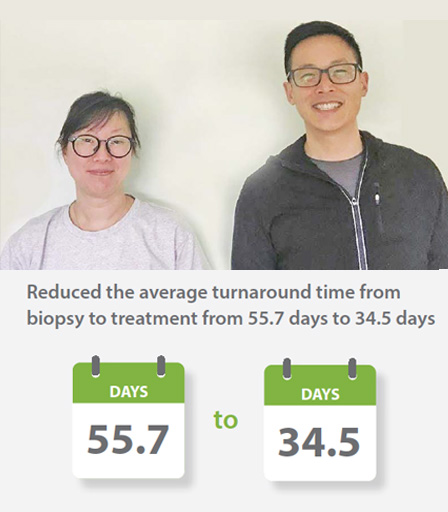
"This gives us the momentum to be able to keep doing it for other things – apply to other oncological treatments that might use this similar type of testing. It’s portable and replicable across everyone in the community or in a big centre.” - Dr. Karen Ung
Engaging with the BC Cancer Agency to reduce diagnosis turnaround times
Medical Oncologist Dr. Jeremy Ho and Pathologist Dr. Karen Ung engaged with Richmond Hospital Radiology, Respirology, Oncology and Pathology colleagues and the BC Cancer Agency (BCCA) to create a new pathway for speeding pathology and biomarker results in new diagnoses of lung cancer.
The changes reduce delays for worried patients waiting for a diagnosis, and speed up critical treatment planning.
Creating a pathway of steps to identify barriers
The group joined together over three multidisciplinary meetings to explore ways to save time and improve the standard of care for lung cancer diagnosis.
They laid out a visual pathway of existing steps to identify delays, barriers and solutions, flagged mistaken assumptions, and increased everyone's knowledge about respective roles and requests. Physicians saw the impact their decisions on the overall patient journey.
A more efficient biopsy process
The group identified where small shifts in roles could make a difference such as having respirologists take multiple biopsy tissue in the initial diagnostic for BCCA molecular testing; having investigations occur in parallel instead of waiting for one test result beforethe next; and improving coordination of processes with the BCCA.
Turnaround time drops by 21+ days; potential for other treatments and hospitals
The new pathway reduced the average turnaround time from biopsy to treatment from 55.7 days to 34.5 days – a drop of more than 21 days. Further plans include looking at other oncological treatments that could benefit from similar approaches.

"Just because it’s the way it’s always been, doesn’t mean we just have to accept it.” - Dr Jeremy Ho
LEARN MORE: Go to full article
![]()
 |
 |
 |

